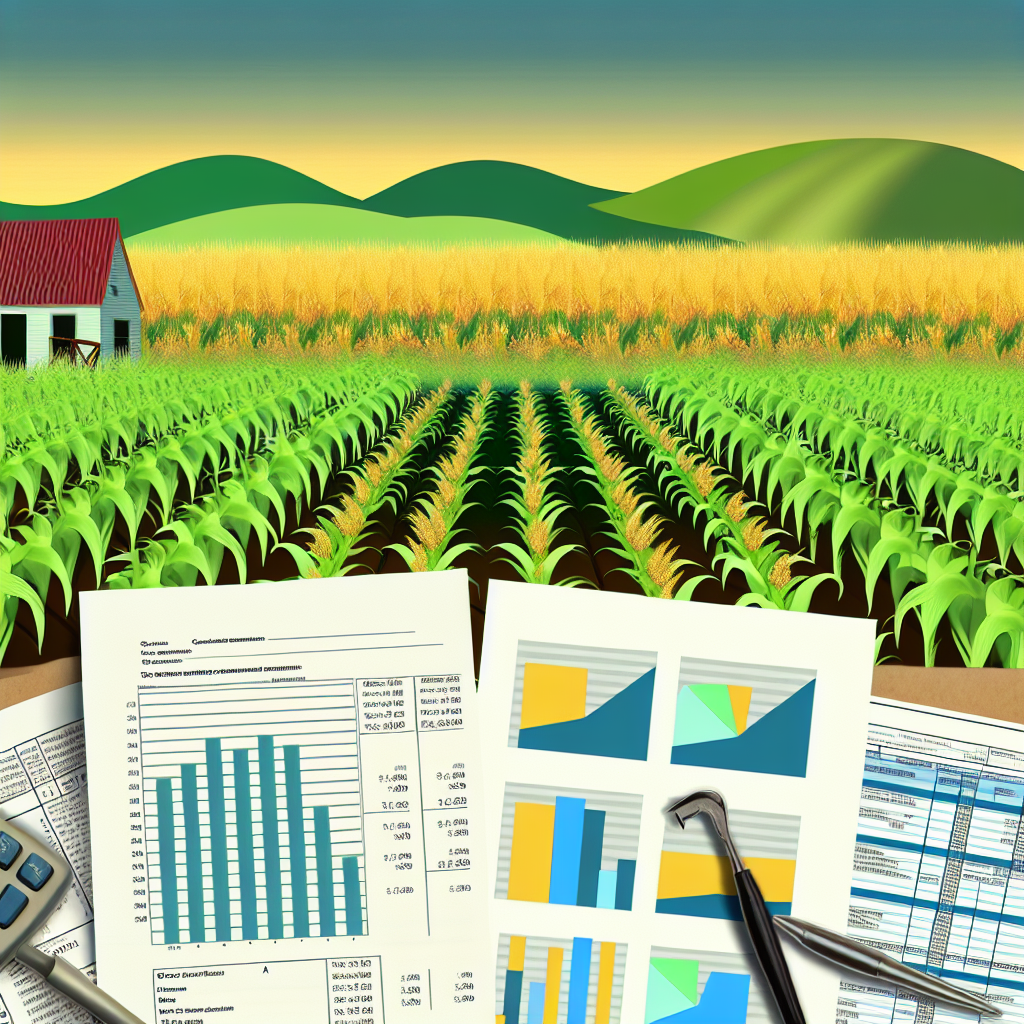Understanding Farm Income Tax Basics
Overview of Farm Income Taxes
Farm income taxes can significantly impact agricultural profitability.
Understanding these taxes helps farmers make informed financial decisions.
Generally, farm income includes all revenue from agricultural activities.
Common Sources of Farm Income
Farm-related income can come from various sources.
- Sale of crops and livestock contributes substantially.
- Government payments often support farm income during tough times.
- Rental income from leasing land can provide additional cash flow.
Understanding Deductions and Credits
Deductions can lower your taxable income significantly.
Common deductions include operating expenses and depreciation.
Tax credits reduce overall tax liability, boosting profits.
- The Investment Tax Credit encourages farm investment.
- The Earned Income Tax Credit benefits low- to moderate-income farmers.
The Importance of Record-Keeping
Accurate record-keeping helps in preparing tax returns efficiently.
Maintain comprehensive records of all income and expenses.
This practice simplifies audits and supports your claims for deductions.
Working with Tax Professionals
Tax professionals can provide valuable insights and strategies.
They help navigate complex tax laws that affect farmers.
Hiring someone knowledgeable ensures compliance and optimization.
Common Tax Deductions for Farmers
Operating Expenses
Farmers can deduct operating expenses from their taxable income.
This includes costs related to seed, fertilizer, and pesticide purchases.
Transform Your Agribusiness
Unlock your farm's potential with expert advice tailored to your needs. Get actionable steps that drive real results.
Get StartedAdditionally, repairs and maintenance on equipment qualify for deductions.
Farmers may also deduct expenses for utilities essential for farm operations.
Advertising and promotional costs are also eligible for tax deductions.
Depreciation on Equipment
Farmers should take advantage of depreciation deductions on machinery.
Qualified equipment includes tractors, combines, and irrigation systems.
Depreciation allows farmers to spread the cost of equipment over its useful life.
This strategy can significantly lower taxable income over the years.
Vehicle Expenses
Farm vehicles used for business purposes may be eligible for deductions.
Farmers can choose between the standard mileage rate or actual expenses.
It’s crucial to keep detailed records of vehicle use for tax purposes.
Don’t forget to include any repairs and maintenance costs as well.
Employee Wages
Wages paid to farm employees are fully deductible.
This includes salaries, benefits, and payroll taxes paid on behalf of employees.
Employers should understand how to report these deductions accurately.
Such deductions help reduce overall business expenses significantly.
Land Improvements
Deductions may also apply to costs for land improvements.
This includes expenses for drainage, fencing, and irrigation systems.
Enhancements made to enhance land productivity can be deducted.
Documenting these expenses accurately will maximize tax benefits.
Interest on Farm Loans
Farmers can deduct interest paid on loans taken for business purposes.
Qualifying loans include those for purchasing land, livestock, and equipment.
This deduction helps alleviate the financial burden of borrowing costs.
Maintaining clear records of loan agreements is essential for this deduction.
Insurance Premiums
Insurance premiums for farm operations are also deductible.
Showcase Your Farming Business
Publish your professional farming services profile on our blog for a one-time fee of $200 and reach a dedicated audience of farmers and agribusiness owners.
Publish Your ProfileThis includes liability, property, and crop insurance policies.
By understanding these deductions, farmers can lower taxable income.
It’s crucial to keep invoices and payment records for verification.
Utilizing Depreciation to Maximize Tax Benefits
Understanding Depreciation
Depreciation allows farmers to write off the cost of equipment over time.
This financial strategy reduces taxable income effectively.
For instance, a tractor purchased for $50,000 may be depreciated over five years.
Essentially, the farmer can deduct $10,000 annually from taxable income.
Types of Depreciation Methods
Farmers can choose between several depreciation methods.
Firstly, the Straight-Line Method spreads the deduction evenly over the asset’s life.
For example, a $30,000 piece of equipment used over six years sees $5,000 deducted annually.
Secondly, the Accelerated Method allows a larger deduction in the early years.
Assets like machinery often benefit from this method due to their rapid wear and tear.
Section 179 Deduction
The Section 179 Deduction offers immediate expense benefits for certain assets.
This deduction allows farmers to deduct the full purchase price of qualifying equipment.
In 2023, the limit is $1,160,000, providing significant tax relief.
This strategy works best for small to medium-sized farms purchasing new equipment.
Bonus Depreciation
Bonus depreciation provides additional tax benefits for eligible assets.
Farmers can take an additional percentage of an asset’s cost as a deduction.
For 2023, the bonus depreciation rate is 80%, applicable for new and used equipment.
This enhances cash flow and allows reinvestment into the farm’s operations.
Impact on Overall Tax Strategy
Utilizing depreciation strategies can significantly affect a farmer’s tax liabilities.
By reducing taxable income, farmers increase their net income efficiently.
Planning ahead with these deductions fosters financial growth.
Additionally, proper understanding and implementation can lead to greater investment opportunities.
Informed tax strategies maximize profit potential in agricultural operations.
See Related Content: Impact of Land Use Policies on Farming
Tax Credits Available for Agricultural Operations
Overview of Agricultural Tax Credits
Tax credits can significantly enhance farm profitability.
Understanding available credits is essential for every farmer.
These credits directly reduce tax obligations, boosting cash flow.
Types of Agricultural Tax Credits
Several important credits exist to assist agricultural operations.
These include credits for conservation, production, and renewable energy.
Conservation Tax Credit
This credit incentivizes farmers to implement environmentally friendly practices.
For example, it encourages practices like rotational grazing and cover cropping.
Farmers can receive deductions for eligible expenses incurred.
Production Tax Credit
Farmers generating renewable energy can benefit from this credit.
This includes solar panels and wind turbines on their farms.
Such initiatives not only support sustainability but also enhance farm income.
Research and Development Credit
This credit supports innovations in agricultural methods and technologies.
By investing in research, farmers can qualify for substantial tax offsets.
It encourages continual improvement in agricultural processes.
Showcase Your Farming Business
Publish your professional farming services profile on our blog for a one-time fee of $200 and reach a dedicated audience of farmers and agribusiness owners.
Publish Your ProfileEligibility Criteria for Tax Credits
Eligibility requirements may vary based on the type of credit.
Farmers should maintain detailed records of expenditures.
Additionally, they must comply with all local and federal regulations.
How to Apply for Agricultural Tax Credits
Applying for tax credits requires specific documentation and forms.
Farmers should consult a tax professional for accurate guidance.
Timely submission ensures access to available credits.
Maximizing Tax Benefits
Strategically planning purchases can help maximize tax credits.
Farmers should time their investments to align with tax cycles.
Furthermore, education on new credits can lead to opportunities.
Learn More: Agricultural Tax Credits and Incentives Explained
Strategies for Income Splitting to Reduce Tax Liability
Understanding Income Splitting
Income splitting reduces overall tax liability for farming families.
It allows higher income members to pass some income to lower earners.
This strategy helps in utilizing lower tax brackets effectively.
Moreover, it can enhance overall family income management.
Utilizing Spousal Income Splitting
Married couples can benefit from spousal income splitting.
This method involves transferring income-producing assets to a lower-income spouse.
For instance, consider transferring farm shares to your partner.
This transfer may lessen the couple’s combined tax burden.
Consequently, the family retains more income for operations.
Engaging Family Members in the Business
Including family members in the farm business presents a tax advantage.
Paying family members for assistance helps distribute income.
Ensure the payments reflect their actual work and contributions.
Additionally, family members may qualify for lower tax rates.
Establishing a Family Limited Partnership
A family limited partnership (FLP) can facilitate income splitting.
In an FLP, family members can hold shares while keeping control with seniors.
This structure often helps minimize tax by distributing income among members.
Moreover, it provides a vehicle for estate planning and asset protection.
Implementing Trusts for Tax Efficiency
Using trusts can be a powerful strategy for income splitting.
Trusts allow income to be distributed to beneficiaries in lower tax brackets.
This approach can significantly reduce the overall tax burden.
Remember to consult a tax professional to set this up correctly.
Practical Considerations
Always review tax implications before making any income-splitting arrangements.
Seek advice from a tax advisor with agricultural expertise.
Document all transactions to maintain transparency with tax authorities.
Furthermore, stay updated on tax laws as they evolve regularly.
Ultimately, strategic income splitting can enhance farm profitability.
Discover More: Strategies to Utilize Farm Financial Aid Wisely

The Importance of Record Keeping for Tax Compliance
Maintaining Accurate Records
Accurate record keeping is essential for successful farm management.
It enables farmers to track income and expenses effectively.
Additionally, it helps in filing accurate tax returns.
Showcase Your Farming Business
Publish your professional farming services profile on our blog for a one-time fee of $200 and reach a dedicated audience of farmers and agribusiness owners.
Publish Your ProfileFarmers should document every transaction consistently.
This practice minimizes the risk of tax audits.
Types of Records to Keep
Farmers must maintain various types of records.
- Sales records document income from sales.
- Expense records track all costs related to farming activities.
- Inventory records provide insights into crops and livestock.
- Bank statements help verify financial transactions.
Moreover, farmers should record their equipment purchases.
These records are vital for depreciation calculations.
Utilizing Technology for Record Keeping
Technology can simplify the record-keeping process.
Farm management software can automate many tasks.
This software helps organize financial records efficiently.
Additionally, cloud storage options ensure data safety.
Farmers can access their records from any location.
Reviewing and Updating Records Regularly
Regularly reviewing records is crucial for accuracy.
Farmers should establish a routine for updates.
Frequent checks help identify discrepancies early on.
This proactive approach can save time during tax season.
Benefits of Good Record Keeping
Good record keeping offers numerous benefits.
It enhances financial transparency for the farm.
Furthermore, it aids in securing loans or grants.
Potential investors appreciate well-maintained records.
Effective record keeping ultimately boosts overall profitability.
Delve into the Subject: Role of Farm Subsidies in Agricultural Growth
Planning for Capital Gains Tax in Farm Sales
Understanding Capital Gains Tax
Capital gains tax applies when you sell farm property at a profit.
It’s essential to know the difference between short-term and long-term capital gains.
Short-term gains occur on assets held for a year or less.
Consequently, these are taxed at ordinary income rates.
On the other hand, long-term gains apply to assets held for more than a year.
Long-term gains receive favorable tax rates, often lower than ordinary income rates.
Strategies to Minimize Capital Gains Tax
There are several strategies to consider for minimizing capital gains tax.
- Utilize tax-loss harvesting.
- Consider using a like-kind exchange.
- Maintain accurate records of property improvements.
Tax-loss harvesting involves offsetting gains with losses from other investments.
Like-kind exchanges allow you to defer taxes by reinvesting proceeds into similar properties.
Keeping detailed records helps prove the property’s adjusted basis.
Timing Your Sales
Timing can significantly affect your capital gains tax liability.
Selling assets early in the year can provide a longer timeframe for tax planning.
Additionally, understanding your income levels can guide your sale timing.
Overall, lower income in a given year may help reduce your tax burden.
Consulting Professionals
Consulting a tax advisor is crucial for effective planning.
These professionals understand complex tax laws and can provide tailored strategies.
They can also help you navigate specific regulations affecting farm sales.
Moreover, staying informed about tax law changes can benefit your planning efforts.
Utilizing Tax Credits and Deductions
Explore available tax credits and deductions for farmers.
- Look for energy efficiency credits.
- Investigate deductions for equipment purchases.
- Consider conservation-related tax benefits.
Tax credits directly reduce the amount of tax owed.
Showcase Your Farming Business
Publish your professional farming services profile on our blog for a one-time fee of $200 and reach a dedicated audience of farmers and agribusiness owners.
Publish Your ProfileDeductions lower your taxable income, helping reduce overall tax liability.
Keeping Accurate Records
Record keeping is vital for effective tax strategy planning.
Maintain records of all transactions and property improvements.
Documentation supports your tax positions during audits.
Additionally, organized records streamline the tax preparation process.
Engaging with a Tax Professional: When and Why
Recognizing the Need for Expert Guidance
Tax regulations can be complex and challenging for farmers.
Understanding these regulations is crucial for maximizing farm income.
A tax professional can provide clarity and insight into the law.
They help farmers navigate potential financial pitfalls.
Therefore, knowing when to seek their expertise is important.
Identifying Key Moments to Consult
Engage a tax professional during major life changes.
Changes such as property acquisition or inheritance often trigger new tax implications.
Another key moment is during tax season.
Having professional assistance can make the process smoother.
Additionally, when expanding your farm, consulting an expert can provide budgetary support.
Understanding the Benefits of Professional Help
Tax professionals offer numerous advantages for farmers.
They stay updated on changing tax laws and regulations.
Moreover, they can help identify deductions and credits applicable to your situation.
This can significantly reduce your tax liability.
Furthermore, professionals can provide strategic planning for the future.
Choosing the Right Tax Professional
Selecting a qualified tax professional is essential.
Look for someone with experience in agricultural tax issues.
Check their credentials and ask for references.
Additionally, ensure they are available year-round, not just during tax season.
This availability ensures ongoing support and guidance.




